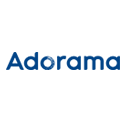Nikon Coolpix P510 Review
Nikon Coolpix P510 Introduction
As the latest ultra-zoom in Nikon's performance-series, the Coolpix P510 boasts the most powerful optical zoom of all. With an equivalent focal-range of 24-1000mm, the P510 reaches an unreal 42X optical zoom ratio. Behind its impressive lens is a 16 megapixels high-speed CMOS sensor which can capture full 1080p HD video and shoot full-resolution images continuously at 7 FPS.
The P510 is a prosumer digital camera with full manual controls including manual-focus, custom white-balance, choice of metering, and bracketing. Its miniature DSLR-shape offers dual control-dials and dual zoom-controllers, making it unique among ultra-zooms. Framing is possible via a large tilting 3" LCD and a small protruding EVF.
This digital camera review analyses all the features, usability, performance and image quality of the Nikon Coolpix P510.
Nikon Coolpix P510 Features
Sensor & Exposure
- 16 Megapixels CMOS sensor
- ISO 100 to 6400 sensitivity at full-resolution
- Monochrome ISO 12800 Scene-Mode
- Auto ISO with customizable shutter-speed limit
- 1/4000s Maximum Shutter-Speed
- 8s Minimum Shutter-Speed at ISO 100ISO 200-400: 4s Minimum, One stop less for each additional ISO stop.
- PASM Exposure modes
- Program-Shift in P mode
- Exposure-Compensation, ±2 in 1/3 EV increments
- Exposure Bracketing, 3 frames, maximum ±1 EV
- Multi-Segment, Center-Weighed and Spot metering
Lens
- 42X Optical zoom range
- Ultra-Wide-Angle 24-1000mm equivalent
- F/3-5.9-8.4 Aperture range
- Optical Image Stabilization
- 1cm (W) - 1.5m (T) Minimum focus distance
- Dual zoom-controllers
Image Parameters
- Two AutomaticStandard & Warm-Lighting, 7 presetsDaylight, Incandescent, 3 Fluorescent, Cloudy, Flash, , and custom white-balance
- WB fine-tuning, 7 steps for 4 of the presets
- Standard, Neutral, Vivid and B&W color modes
- Adjustable Contrast, Sharpness and Saturation, 7 steps each
- Noise-Reduction, 3 levels
Focus
- Normal, Macro, Manual and Infinity focus modes
- Face-Detect, Automatic, Single, Center, Tracking and Targeting focus-point selection
- Single-shot and continuous focus tracking
- Autofocus Assist-Lamp
Drive
- Single-shot
- 7 FPS @ full-resolution
- 60 FPS @ 1 megapixels
- 120 FPS @ 0.3 megapixels
- Preshooting cache
- Best-Shot-Selection (BSS)
- Multi-Shot 16
- Interval-Timer, 30s-10m
- Self-Timer, 2s, 10s or Smile
Display & Viewfinder
- Tilting 3" LCD, 920K Pixels
- 0.2" EVF, 200K Pixels
- Live histogram
- Framing grid
- Adjustable LCD brightness
Video
- 1920x1080 @ 30 FPS
- 1280x720 @ 60 FPS, High-Speed Video
- 640x480 @ 120 FPS, High-Speed Video
- 1920x1080 @ 15, Slow-Speed Video
- AF-S or AF-C focus
- Built-in stereo microphone
Flash
- Flash-Compensation, ±2 in 1/3 EV increments
- Auto, Auto Redeye, Off, Forced, Slow-Sync & Rear-Sync flash modes
Connectivity
- HDMI (1080i) output
- A/V (NTSC / PAL) output
- USB 2.0 connectivity
Misc
- 4:3 (Native), 3:2, 16:9 & 1:1 Aspect-Ratio
- Dual Zoom-Controllers
- Dual Control-Dials
- Customizable Fn button
- Panorama Assist Mode
- Built-in GPS unit
- HDR mode, 3 levels
- SDXC memory
- Internal-Charging Lithium-Ion battery
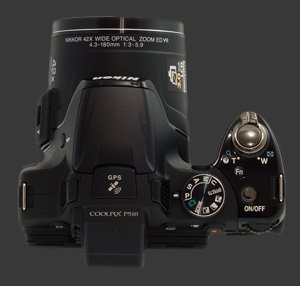
Nikon Coolpix P510 Suitability - What is it good for?
Being a prosumer ultra-zoom, the Nikon Coolpix P510 has a very complete feature set and is far more versatile than the vast majority of fixed-lens digital cameras. Its 42X optical zoom range is obvisously a unique asset and the 24-1000mm range covers most photographic needs from architecture to wildlife with everything in between. Very few lenses can reach that far and those which do are extremely heavy and expensive, so the P510 brings more portability than ever for wildlife and other types of long-distance photography.
This digital camera includes a complete set of manual controls including a shutter-speed range of 1/4000s to 8s. The fastest shutter-speed is quick enough to freeze most action while the slowest is long enough for some night photography. There are a number of restrictions on shutter-speeds which reduce creative possibilities though. In particular, the fastest shutter-speed is only available at small apertures and the slowest one is only available at the base ISO of 100. Both ISO 200 and 400 allow exposures of up to 4s but the minimum shutter-speed drops by one stop of every additional sensitivity stop.
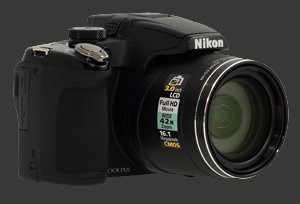
Having manual focus available greatly helps since low-light photography is often problematic for autofocus. Additionally, the P510 boasts an Infinity focus mode which helps of shooting scenery from a moving vehicle where the camera would not have enough time to focus.
The high-speed CMOS sensor and mechanical shutter can shoot continuously at 7 FPS, which is fast but not class-leading. There are also low-resolution high-speed drive modes up to 120 FPS which are useful to capture precise moments of action. In those modes, focus remains locked at the initial distance.
The limitations of this Coolpix are all inherent from its small sensor size. This is the case for all ultra-zooms but not for DSLRs and most ILCs. Given its sensor-size, the Nikon P510 is not suitable for low-light hand-held photography such as indoor and social events. There is also a limitation in terms of creativity due to the high depth-of-field produced by small sensors like the one used here. Still, far away subjects can be isolated from the background by using the incredibly long zoom of this digital camera.
The small sensor is actually an asset for macro photography which often suffers from too little depth-of-field. Thanks to a minimum focus distance of 1cm, the P510 can capture tiny objects like jewelry in great details.
Nikon Coolpix P510 Usability - How easy is it to use?
The Nikon Coolpix P510 has an ergonomic design which is similar to a miniaturized DSLR. It has a deep hand-grip with non-slip rubber-coating and a solid protruding lens barrel. This lets the photographer hold the camera very steadily which is essential to use the astronomic focal-lengths reached by this ultra-zoom. The grip and the lens barrel each offer a zoom controller, making it possible to zoom with either hand. The top of the camera has a combined popup flash and a viewfinder that protrudes from the back of the camera for added comfort.
The shutter-release is located at the top of grip. It is a standard two-stage release with a soft halfway point. A two-speed speed zoom-controller is wrapped around the release. The lens moves quickly, going across the 42X zoom in just 3s. There are 39 steps across the whole range, making zooming relatively precise but not perfect.
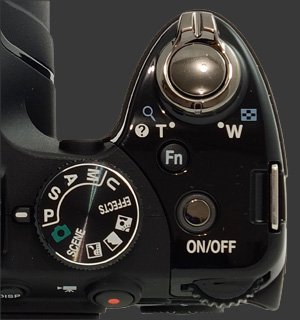 Behind the shutter-release is a tiny programmable Fn button. There are 7 functions to choose from: Image Size, Picture Control (Style), White-Balance, Metering, Continuous, ISO and AF-Area mode. Since there is no dedicated ISO button, the most useful function here is ISO. Unfortunately, its implementation is frustrating. Instead of simply pressing the ISO button and turning a control-dial, the ISO function pops up a menu which includes ISO sensitivities as a sub-menu. The other sub-menu is only enabled for Auto ISO and sets the minimum shutter-speed to keep while automatically adjusting sensitivity. While this is a useful function, it would have been much better if the menu levels were inverted and the minimum shutter-speed would be a sub-menu of Auto ISO.
Behind the shutter-release is a tiny programmable Fn button. There are 7 functions to choose from: Image Size, Picture Control (Style), White-Balance, Metering, Continuous, ISO and AF-Area mode. Since there is no dedicated ISO button, the most useful function here is ISO. Unfortunately, its implementation is frustrating. Instead of simply pressing the ISO button and turning a control-dial, the ISO function pops up a menu which includes ISO sensitivities as a sub-menu. The other sub-menu is only enabled for Auto ISO and sets the minimum shutter-speed to keep while automatically adjusting sensitivity. While this is a useful function, it would have been much better if the menu levels were inverted and the minimum shutter-speed would be a sub-menu of Auto ISO.
Passed the Fn button towards the back of the camera is a small power-button. It is flush with the camera surface to prevent accidental activation. To its left is a traditional mode-dial with good detents. There are 11 positions on the mode-dial, including the classic PASM modes. There is a single User settings mode which can be any of the regular PASM modes with associated settings. There is also a completely Auto mode which locks ISO, Picture Control, WB, Metering, Drive (excluding Self-Timer), Autofocus, FC and Noise-Reduction. to some default.
There are 5 remaining positions on the mode-dial which can all be considered Scene modes. There are 19 modes at the Scene position, plus one position for Landscape, Night Landscape, Backlit and Effects. Nikon likes to hide their camera's HDR features behind the Backlit scene which offers three levels of HDR blending and a single-shot-with-fill-flash mode.
There are 4 notable scene modes:
- High ISO Monochrome: This one under Effects captures imagery in Black&White at ISO 12800.
- Easy Panorama: Takes a low resolution panorama spanning 180° or 360° right in the camera while panning the camera in any horizontal or vertical direction.
- Panorama Assist: Locks all camera settings and helps take a sequence of images to be stitched by computer later. All panoramic directions are supported.
- 3D Photography: Produces a 3D image in MPO format from two shots taken. The first one it taken normally and the second automatically when the camera is moved slightly sideways.
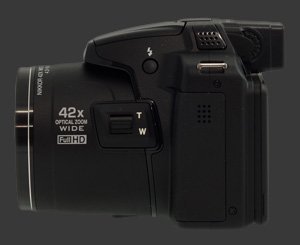
The side of the camera shows to controls. At the top is a small button which serves to release the flash. Luckily this has to be done to use flash and it never pops up without the photographer's consent. When flash is needed for a particular Scene Mode, the camera prompts the user to raise it. Right on the lens barrel is a second zoom controller. This one moves the lens slowly across its zoom range, taking just over 5 seconds to reach 1000mm from 24mm. Using this controller forces the added stability of using the camera with both hands.
The Nikon P510 has a relatively large number of external controls. All the remaining ones are found at the back of the camera, spread around the LCD and EVF. At the right of the camera, there are two control-dials - which no other ultra-zoom has - with a combined 4 way controller and several buttons around it.
Starting at the top, there is a dedicated Video Record button. The P510 lacks a video mode so this button is the only way to record video. As usual, this not very practical as the camera shows the image framing. An optional display overlay shows the reduced area from which video will be recorded. This at least makes it possible to frame video with good accuracy. However, the camera is never ready to record video, so when Video Record is pressed, recording starts 2½s later.
At the right edge of the camera is the upper control-dial. This one selects shutter-speed in Shutter-Priority and Manual mode. It also applies Program-Shift in Program mode. A rubberized area below it provides a place for the thumb to hold on. To its left is the Playback button which operates exactly as expected.
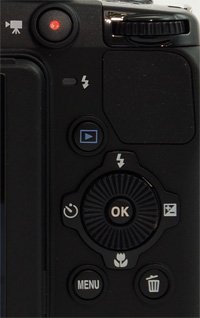 The four-way controller below also serves as the second control-dial. The dial controls the aperture in Aperture-Priority and Manual modes. Since this dial is lower and more awkward to use then the upper dial, it is a shame that the upper-one remains unused in Aperture-Priority.
The four-way controller below also serves as the second control-dial. The dial controls the aperture in Aperture-Priority and Manual modes. Since this dial is lower and more awkward to use then the upper dial, it is a shame that the upper-one remains unused in Aperture-Priority.
The 4-way controller has a function assigned to each direction:
- Up: Controls the Flash mode but only when the flash is already raised. Otherwise the last chosen mode is remembered by the flash does not fire.
- Right: Brings up the Exposure-Compensation display. Either control-dial or the vertical arrows can be used to dial in EC. Confirmation is not required.
- Down: Chooses between Autofocus, Macro Autofocus, Infinity and Manual focus. To focus manually, press the central OK button and use the vertical directions.
- Left: Choose between immediate release, 2s Self-Timer, 10S Self-Timer and Smile timers. Annoyingly Self-Timers are reset after each use and when changing exposure modes.
Below the 4-way controller are the Menu and Delete buttons. Menu works as usual and so does the Delete button, except in Capture mode where is immediately prompts to have the last taken image deleted. This is a great shortcut to get rid of an image as soon as it is taken.
The last two buttons are found on either side of the viewfinder. One switches between using the LCD and EVF, the other cycles through a number of available display modes. These include a live histogram in Capture mode and a Luminance histogram in Playback mode.
At 0.2" and 200K pixels, the EVF on the P510 is tiny, coarse, dim and has poor contrast. Still, it is better than not having one and provides more stability when shooting which is very important towards the telephoto end of the zoom. There is not enough resolution to tell what is in focus, so MF is best done using the rear LCD instead. Speaking of, the 3" LCD is bright, clear and crisp with 920K pixels of resolution. Contrast is good an motion is reasonably fluid.
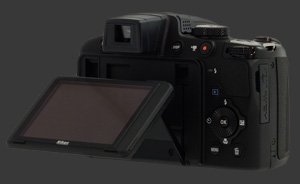 The only issue with both the LCD and EVF is that neither is Exposure-Priority. This means that some captured images come out very different from the preview. This difference is exaggerated in low-light when the images can appear very dark compared to the final result. The Live-Histogram is useless when this happens since it is based on display brightness rather than metering. The P510 therefore requires more image checking than plenty of cameras. The LCD is connected to the camera via a double hinge which lets it tilt vertically for framing at odd angles. The hinge appears to be reasonably well built.
The only issue with both the LCD and EVF is that neither is Exposure-Priority. This means that some captured images come out very different from the preview. This difference is exaggerated in low-light when the images can appear very dark compared to the final result. The Live-Histogram is useless when this happens since it is based on display brightness rather than metering. The P510 therefore requires more image checking than plenty of cameras. The LCD is connected to the camera via a double hinge which lets it tilt vertically for framing at odd angles. The hinge appears to be reasonably well built.
The bottom of the camera has a metal tripod mount which is placed off-center for good balance rather than for panoramic photography. It is unfortunately too close to the compartment door to change memory or batteries without unscrewing the camera from the tripod or quick release plate. The door itself appears sturdy and reveals a small Lithium-Ion battery held in place by a small spring-loading latch and a standard SD card slot which supports SDHC and SDXC cards as well.
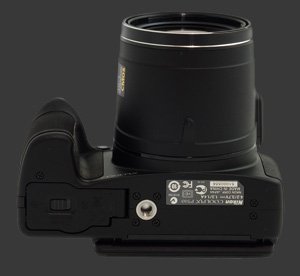 Overall, usability of the Nikon Coolpix P510 is good and shows incremental refinements from previous models. The appearance of dual control-dials and a programmable function button are quite welcome, although they can be utilized better. This is something which can be improved by firmware. The second zoom controller on the lens barrel is also a good idea and would be even better if it moved the lens faster like the controller around the shutter-release.
Overall, usability of the Nikon Coolpix P510 is good and shows incremental refinements from previous models. The appearance of dual control-dials and a programmable function button are quite welcome, although they can be utilized better. This is something which can be improved by firmware. The second zoom controller on the lens barrel is also a good idea and would be even better if it moved the lens faster like the controller around the shutter-release.
A few important functions are accessible from external buttons which lets this digital camera be used with reasonable ease. The lack of a movie-mode is a big omission, considering that this ultra-zoom has a number of useful feature and can record full HD video with stereo sound.
Build quality is satisfying, with a good weight for its size without ever feeling heavy. At just over ½kg (1 lbs) , the Nikon Coolpix P510 is quite compact for its amazing 24 to 1000mm 42X optical zoom. The camera body also serves as charger which is limiting but makes for even more compact travel-weight. This also gives it the ability to be recharged by computer which may appeal to some users.
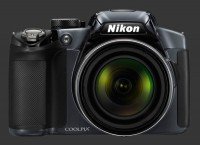 |
Please Support Neocamera
All information on Neocamera is provided free of charge yet running this website is a huge endeavor. Purchases made via affiliate links found throughout the site help keep it running and up-to-date. There is no additional cost to you, so please consider buying via these links to our affilates:
If you found any information on this site valuable and did not purchase via our affiliate links, please considering donating via PayPal:
Any amount will be greatly appreaciated. Thank you for your support!
Nikon P510 Highlights

Sensor-Size: 6 x 5mm

Actual size when viewed at 100 DPI
| 16 Megapixels Ultra Zoom | ISO 100-6400 |
| 41.7X Ultra-Wide Optical Zoom | Shutter 1/4000-4s |
| Built-in Stabilization | Full manual controls |
| 0.20" Built-in EVF 200K Pixels | Custom white-balance |
| 7 FPS Drive, 5 Images | Lithium-Ion Battery |
| 1920x1080 @ 30 FPS Video Recording | Secure Digital Extended Capacity, Internal Memory |
| 3" LCD 920K Pixels |
Updates
2024.11.18

Best 2024 Photography Gifts for Every Budget
Great gifts for photographers and photo enthusiasts selected for every budget among the best products of 2024.
2024.08.07

Eye Protection Tips for Professional Photographers
The four main considerations for professional photographers regarding eyewear.
2024.07.14

Fujifilm X100VI Review
Flagship fixed-lens compact digital camera with a 40 MP sensor and Image-Stabilization, a first for the series. Retro design featuring dual control-dials, plus direct ISO, Shutter-Speed and EC dials. Its hybrid viewfinder can switch between EVF and OVF mode.
2024.05.09

Fujifilm GFX100 II Review
Flagship 102 Megapixels Medium-Format Mirrorless Digital Camera with 8-Stop 5-Axis IBIS, 8 FPS Drive, 8K Video and 400 MP Super-Resolution capture in a weatherproof and freezeproof body with dual control-dials and dual memory-card slots.
2024.04.03

Fujifilm X-T5 Review
Newest Fujifilm flagship boasting a 40 MP APS-C sensor, 5-axis IBIS with 7-stop efficiency, 15 FPS continuous drive, 6.2K Video capture, dual control-dials and dual SDXC UHS-II slots in a sturdy weatherproof and freezeproof body.
2023.11.20

Best Digital Cameras of 2023
Find out which are the Best Digital Cameras of 2023. All the new Mirrorless Digital Cameras from entry-level to high-end professional.
2023.07.10

Fujifilm X-H2 Review
40 Megapixels APS-C Hybrid Mirrorless Digital Camera with 7-stop IBIS. Fastest shutter ever and 8K video capture. Large builtin EVF with 0.8X magnification and 5.8 MP, plus an Eye-Start Sensor. Packed with features and large number of controls in a weatherproof and freezeproof body.
2023.05.07

Sony FE 20-70mm F/4G Review
Review of the unique Sony FE 20-70mm F/4G lens. The optical zoom of this lens spans ultra-wide-angle and medium focal-length coverage, making it one of the most versatile Full-Frame lenses on the market.
2023.01.15

Huion Inspiroy Dial 2 Review
Review of the Huion Inspiroy Dial 2 tablet, a medium sized drawing surface with dual dials and customizable buttons. Connects via USB-C or Bluetooth 5.0 with Windows, Linux and Android support.
2022.12.08

How to Pack for a Photo Trip
Find out how to pack for a travel photography trip, carry your gear safely while meeting airline regulations.
2022.11.13

Best Digital Cameras of 2022
The best digital cameras of 2022. A short list of the most outstanding models in their respective categories. Choose one for yourself or as a gift.
2022.09.21

Pentax DA* 60-250mm F/4 SDM Review
Review of the Pentax DA* 60-250mm F/4 SDM, the constant-aperture telephoto zoom with the highest zoom-ratio on the market.








